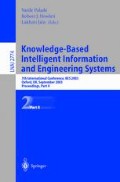Abstract
An integral component of Fuzzy ARTMAP’s training phase is the use of Match Tracking (MT), whose functionality is to search for an appropriate category that will correctly classify a presented training pattern in case this particular pattern was originally misclassified. In this paper we explain the MT’s role in detail, why it actually works and finally we put its usefulness to the test by comparing it to the simpler, faster alternative of not using MT at all during training. Finally, we present a series of experimental results that eventually raise questions about the MT’s utility. More specifically, we show that in the absence of MT the resulting, trained FAM networks are of reasonable size and exhibit better generalization performance.
Access this chapter
Tax calculation will be finalised at checkout
Purchases are for personal use only
Preview
Unable to display preview. Download preview PDF.
References
Carpenter, G.A., Grossberg, S., Markuzon, N., Reynolds, J.H., Rosen, D.B.: Fuzzy ARTMAP: A Neural Network Architecture for Incremental Supervised Learning of Analog Multidimensional Maps. IEEE Transaction on Neural Networks 3(5), 698–713 (1992)
Grossberg, S.: Adaptive Pattern Recognition and Universal Encoding II: Feedback, Expectation, Olfaction, and Illusions. Biological Cybernetics 23, 187–202 (1976)
Mariot, S., Harrison, R.F.: A Modified Fuzzy ARTMAP Architecture for the Approximation of Noisy Mappings. Neural Networks 8(4), 619–641 (1995)
Gomez Sanchez, E., Dimitriadis, Y.A., Cano Izquierdo, J.M., Lopez Coronado, J.: MicroARTMAP: Use of Mutual Information for Category Reduction in Fuzzy ARTMAP. In: Proceedings of the IEEE-INNS-ENNS International Joint Conference on Neural Networks, vol. 6, pp. 47–52 (2000)
Verzi, S.J., Heileman, G.L., Georgiopoulos, M., Healy, M.J.: Boosted ARTMAP. In: Proceedings of the IEEE-INNS-ENNS International Joint Conference on Neural Networks, vol. 1, pp. 396–401 (1998)
Burwick, T., Joublin, F.: Optimal Algorithmic Complexity of Fuzzy ART. Neural Processing Letters 7, 37–41 (1998)
Anagnostopoulos, G.C., Georgiopoulos, M.: Category Regions as New Geometric Concepts in Fuzzy ART and Fuzzy ARTMAP. Neural Networks 15(10), 1205–1221 (2002)
Carpenter, G.A., Gjaja, M.N.: Fuzzy ART choice functions. Proceedings of the World Congress on Neural Networks 5, 133–142 (1994)
Blake, C.L., Merz, C.J.: UCI Repository of machine learning databases. Department of Information and Computer Science, University of California, Irvine, California (1998), http://www.ics.uci.edu/~mlearn/MLRepository.html
Author information
Authors and Affiliations
Editor information
Editors and Affiliations
Rights and permissions
Copyright information
© 2003 Springer-Verlag Berlin Heidelberg
About this paper
Cite this paper
Anagnostopoulos, G.C., Georgiopoulos, M. (2003). Putting the Utility of Match Tracking in Fuzzy ARTMAP Training to the Test. In: Palade, V., Howlett, R.J., Jain, L. (eds) Knowledge-Based Intelligent Information and Engineering Systems. KES 2003. Lecture Notes in Computer Science(), vol 2774. Springer, Berlin, Heidelberg. https://doi.org/10.1007/978-3-540-45226-3_1
Download citation
DOI: https://doi.org/10.1007/978-3-540-45226-3_1
Publisher Name: Springer, Berlin, Heidelberg
Print ISBN: 978-3-540-40804-8
Online ISBN: 978-3-540-45226-3
eBook Packages: Springer Book Archive

